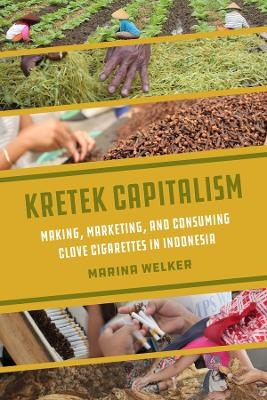
Kretek Capitalism
Making, Marketing, and Consuming Clove Cigarettes in Indonesia
Seiten
2024
University of California Press (Verlag)
978-0-520-39967-9 (ISBN)
University of California Press (Verlag)
978-0-520-39967-9 (ISBN)
A free ebook version of this title is available through Luminos, University of California Press's Open Access publishing program. Visit www.luminosoa.org to learn more.
Indonesia is the world's second-largest cigarette market: two out of three men smoke, and clove-laced tobacco cigarettes called kretek make up 95 percent of the market. Each year, more than 250,000 Indonesians die of tobacco-related diseases. To account for the staggering success of this lethal industry, Kretek Capitalism examines how kretek manufacturers have adopted global tobacco technologies and enlisted Indonesians to labor on their behalf in fields and factories, at retail outlets and social gatherings, and online. The book charts how Sampoerna, a Philip Morris subsidiary, uses contracts, competitions, and gender, age, and class hierarchies to extract labor from workers, influencers, artists, students, retailers, and consumers. Critically engaging nationalist claims about the commodity's cultural heritage and the jobs it supports, Marina Welker shows how global capitalism has transformed both kretek and the labor required to make and promote it.
Indonesia is the world's second-largest cigarette market: two out of three men smoke, and clove-laced tobacco cigarettes called kretek make up 95 percent of the market. Each year, more than 250,000 Indonesians die of tobacco-related diseases. To account for the staggering success of this lethal industry, Kretek Capitalism examines how kretek manufacturers have adopted global tobacco technologies and enlisted Indonesians to labor on their behalf in fields and factories, at retail outlets and social gatherings, and online. The book charts how Sampoerna, a Philip Morris subsidiary, uses contracts, competitions, and gender, age, and class hierarchies to extract labor from workers, influencers, artists, students, retailers, and consumers. Critically engaging nationalist claims about the commodity's cultural heritage and the jobs it supports, Marina Welker shows how global capitalism has transformed both kretek and the labor required to make and promote it.
Marina Welker is Associate Professor of Anthropology at Cornell University and author of Enacting the Corporation: An American Mining Firm in Post-Authoritarian Indonesia.
| Erscheinungsdatum | 17.04.2024 |
|---|---|
| Reihe/Serie | Atelier: Ethnographic Inquiry in the Twenty-First Century ; 13 |
| Zusatzinfo | 20 color illustrations; 2 maps; 1 table |
| Verlagsort | Berkerley |
| Sprache | englisch |
| Maße | 152 x 229 mm |
| Gewicht | 454 g |
| Themenwelt | Geisteswissenschaften ► Archäologie |
| Sozialwissenschaften ► Ethnologie | |
| Sozialwissenschaften ► Soziologie | |
| ISBN-10 | 0-520-39967-6 / 0520399676 |
| ISBN-13 | 978-0-520-39967-9 / 9780520399679 |
| Zustand | Neuware |
| Haben Sie eine Frage zum Produkt? |
Mehr entdecken
aus dem Bereich
aus dem Bereich
Holocaust heritage, noncitizen futures, and black power in Berlin
Buch | Softcover (2022)
University of California Press (Verlag)
CHF 52,35
Life, Death and Disease in the Middle Ages and Beyond
Buch | Hardcover (2024)
Simon & Schuster Ltd (Verlag)
CHF 38,40


